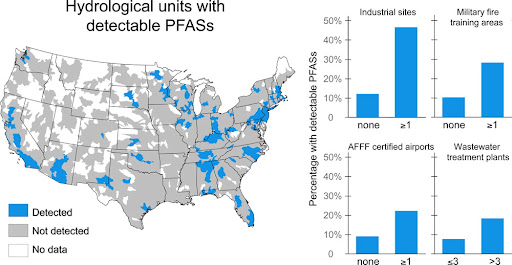“Forever chemicals” found in PA drinking water can have cascading effects

It’s difficult for a national limit to be enacted, so a limit on PFASs isn’t an easy achievement. “Doing anything nationally is difficult because it requires so many people to agree on it,” explained Webb.
February 9, 2023
Drinking water systems in Bucks and Montgomery counties have tested positive for toxic “forever chemicals”. In 2021, the Department of Environmental Protection found one third of over 400 tested sites in PA had one or more of these chemicals. Water treatment facilities are not designed to filter out these chemicals resulting in contaminated drinking water.
“It’s most likely been going on for a while, but it’s recent that we’re testing for those,” said ecology and environment teacher Eric Webb.
Perfluorooctanoic acid and perfluorooctane sulfonic acid belong to a chemical group called PFAS, found in non-stick cookware, carpets, firefighter foam and fast food wrappers. These are nicknamed “forever” because they persist in the environment and human body and are not naturally found in ecosystems.
“There’s lots that we don’t understand about these chemicals and we’re creating new synthetics. We don’t always understand how they will react with other chemicals,” said Webb.
These chemicals are associated with cancer, thyroid disease and ulcerative colitis according to the Environmental Protection Agency. These synthetics can also have cascading effects that have not yet been determined because they are new. The long term impacts are also unknown. This has developed a major concern for ecologists, due to chemical runoff damaging aquatic vegetation and animals.
“Lasting chemicals in the water is something that should be covered more because it’s not something that can be sustained and controlled,” said junior Earth Savers President Zachary Smith.
Since these water systems were found adjacent to military bases, many have insisted there is a connection and demand the government be held accountable. This issue is nationwide and while there is no national limit, the advisory level is 70 parts per trillion (ppt). This is approximately five times the new PA state limit of 14-18 ppt. Any larger is deemed “unsafe”. When this happens the site is commonly treated with granular activated carbon and people are advised to use a water purifier or drink bottled water. This legislation also works to prevent future polluters and clean any affected sites.
“At the state level that’s a start certainly, any limit is better than no regulations at this point,” stated Webb.
Webb explained the importance of people being aware of the water quality around them because we depend on water for everything.
“We are water, and we require good clean water to grow our food, to drink and to live,” he said.
Webbs’ ecology and environment class focuses on water quality locally. Students sample and test water from the Codorus Creek behind the high school. The water is tested for pH, alkalinity, dissolved oxygen, nitrates and phosphates. In addition, the class tests using biology by looking at the number and abundance of indicator species.
A state limit on dangerous chemicals is a step in the right direction for the environment.

